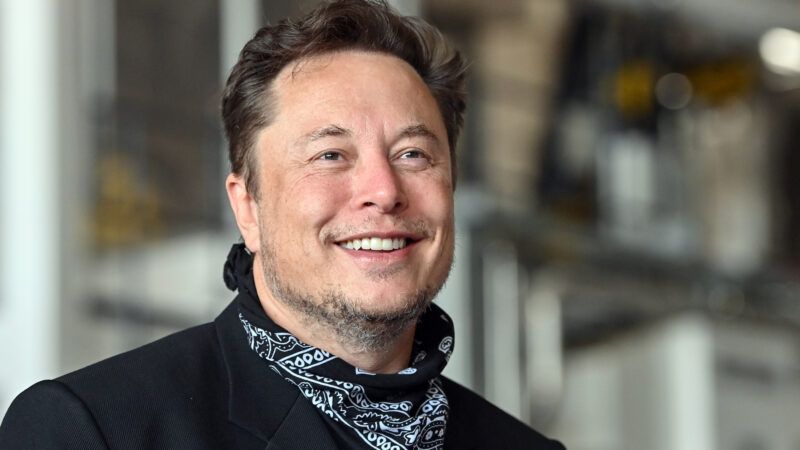Elon Musk's Takeover Will Not Destroy Twitter or Democracy
"I hope that even my worst critics remain on Twitter, because that is what free speech means," said Musk.

Twitter has a new sheriff in town, and his name is Elon Musk. The world's wealthiest man offered to buy the social media site for $44 billion, and the company's board accepted the offer yesterday.
Musk has many reasons for buying the company, but his main drive appears to be to preserve—or even strengthen—the site's commitment to the principles of free speech.
"Twitter is the digital town square, where matters vital to the future of humanity are debated," tweeted Musk.
Admittedly, the town square analogy is imperfect, as my colleague Liz Wolfe highlighted in her excellent post on the subject. For one thing, Twitter is a private company, rather than a genuinely public space, which means that it is not bound by the First Amendment. Unlike the actual town square, Twitter retains the right to punish users for perfectly legal speech. It's also the case that while Twitter is incredibly important for the political class, journalists, business leaders, and other social influencers, it's not nearly as big or as frequently visited as Facebook, YouTube, or TikTok. As Techdirt's Mike Masnick put it, the entire internet is really the town square; Twitter is one small space that's part of it.
Twitter's social importance is inflated by media and political figures because the site is their preferred virtual meeting ground. This is true of Musk himself; he clearly enjoys the platform, and uses it to great effect, and thus may be overstating its importance to society. But there are many others ways to communicate political messages, and if Twitter ceased to exist tomorrow, it's doubtful that anyone's ability to speak would be irreparably harmed.
Admittedly, the people really overstating Twitter's importance are actually Musk's critics in progressive and mainstream media. And boy are they overstating it: Current Affairs Editor in Chief Nathan Robinson fretted that "the only comforting reason to think [former President] Donald Trump might not win in 2024 is that his prior success was so dependent on his Twitter account. If Musk takes over it's very likely that Trump will be back and therefore unstoppable."
The only comforting reason to think Donald Trump might not win in 2024 is that his prior success was so dependent on his Twitter account. If Musk takes over it's very likely that Trump will be back and therefore unstoppable.
— Nathan J Robinson (@NathanJRobinson) April 25, 2022
Robinson apparently thinks that Trump's ability to win reelection hinges on whether he's on Twitter. Not the shape of the U.S. economy, the direction of the pandemic, or whether President Joe Biden's ill-considered policies have created an opening for the former president…but Twitter.
Frustratingly, many liberals and progressives—especially in the media—have convinced themselves that the only way to effectively counter bad speech is to label it misinformation or harassment and prevent it from being uttered. This runs counter to Musk's stated views on the subject, which reflect classically liberal ideas about speech.
I hope that even my worst critics remain on Twitter, because that is what free speech means
— Elon Musk (@elonmusk) April 25, 2022
It's strange to see this idea—that silencing opponents is not only self-defeating but also wrong on principle—transformed into an explicitly right-wing talking point. This is a demoralizing result of the new political reality, in which the journalists and bureaucrats who comprise Team Blue fear and distrust speech they cannot control, while Team Red purports to love free speech even as its political figures wage war on speech they do not like. And it's one that does not work to Democrats' advantage; as Nate Silver points out, free speech in the abstract is extremely popular among the voting public.
The best way to de-politicize the social media free speech debate—and the optimal thing that Musk could do with control of Twitter—would be to devolve content curation to individual users, as I explained in The Los Angeles Times:
"Elon Musk's best bet would be to devolve content curation to individual users. Many on the right are frustrated with Twitter's inconsistently applied rules, regardless of whether they are enforced by algorithms or by human employees of the company; many progressives, on the other hand, are afraid that lax moderation means more misinformation or harassment. The least polarizing way forward is to give users more means of controlling their own feeds. If you have a low tolerance for unpleasantness, you should be able to turn on a setting that shields you from the worst of what can appear on the platform. If you prefer the Wild West, there should be a setting for you, too."
In any case, I hope that fixing Twitter doesn't distract Musk from his far more important goal of colonizing Mars (something NPR criticized as imperialist, because of course they did). We're already a multi-platform species, but not yet a multi-planet species.


Show Comments (136)